Tunisia election: The 'robot' and the pasta magnate freed from jail
- Published
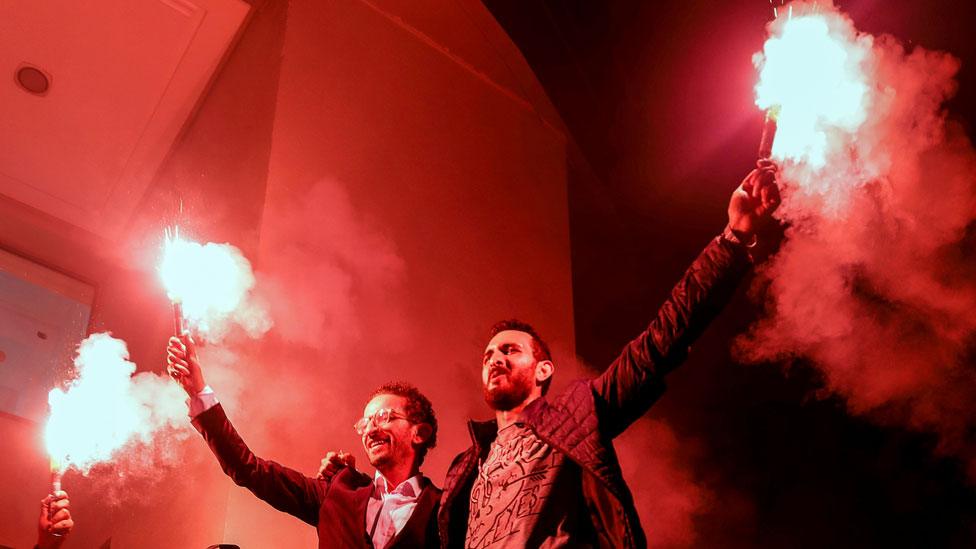
Supporters of Nabil Karoui celebrated after he was freed from jail
Tunisians head to the polls on Sunday to elect a new president, in an election some voters are calling a "catastrophe".
The presidential run-off is between Nabil Karoui, a perceived liberal and populist media mogul who was released from jail four days before the election and Kais Saïed, a perceived conservative who is a professor specialised in constitutional law. Most did not see either candidate coming.
The two men, ranked as outsiders, saw off 24 other candidates in the first round of voting last month. Mr Saied took 18.4% of the vote, while Mr Karoui, who is the head of the Qalb Tounes party, received 15.6%.
Elections in Tunisia were not due until November, but the death of President Beji Caid Essebsi, in July, meant the date had to be brought forward to ensure that a new president would take office within 90 days as required by the constitution. But what the constitution and the country did not envisage was a candidate facing corruption charges running for the highest office.
The candidate who came out of jail
Nabil Karoui was unable to vote in the first election because he was in jail but he was released by an appeal court decision four days before the run-off vote. This makes it more difficult for him to appeal against a possible victory for his rival on the grounds that he was at a disadvantage, analysts say.
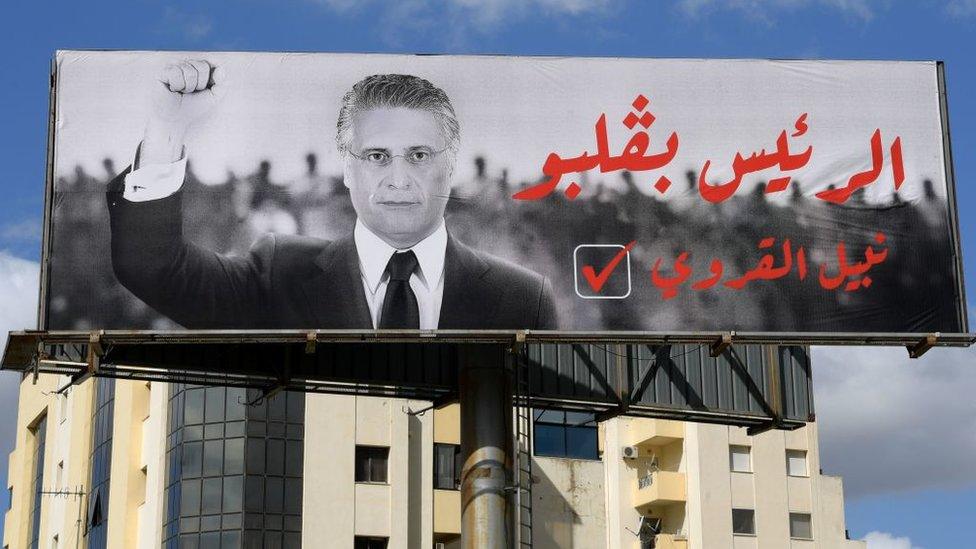
While in jail, his party and supporters led campaigns for Mr Karoui
Dubbed Nabil Makrouna (pasta) for his charity's distribution of money and bags of the staple food, Mr Karoui is viewed by his supporters as a self-made businessman whose philanthropy is praised in a country facing rising costs of living and youth unemployment. He founded the charity to fight poverty - a central theme of his campaign. His opponents have also accused him of using his popular TV station, Nessma, to further his political ambitions.
A retired single mother likened her support for Mr Karoui to a "forced marriage". A street vendor selling jasmine flower is backing him because "there is what you hear and what you see, and I have seen him do good things." Some of the business community back him because of his capitalist liberal ideology.
He was arrested in August on charges of tax evasion and money-laundering shortly before the campaign opened. His supporters accuse powerful forces in the country of conspiring to scuttle his candidacy but authorities say his arrest was based on a three-year-old investigation.
The independent 'robot'
Kais Saïed, a 61-year-old law professor nicknamed "the robot", has run a shrewd and hard campaign, with almost no advertising, on a message of integrity and anti-corruption targeted at young Tunisian voters.
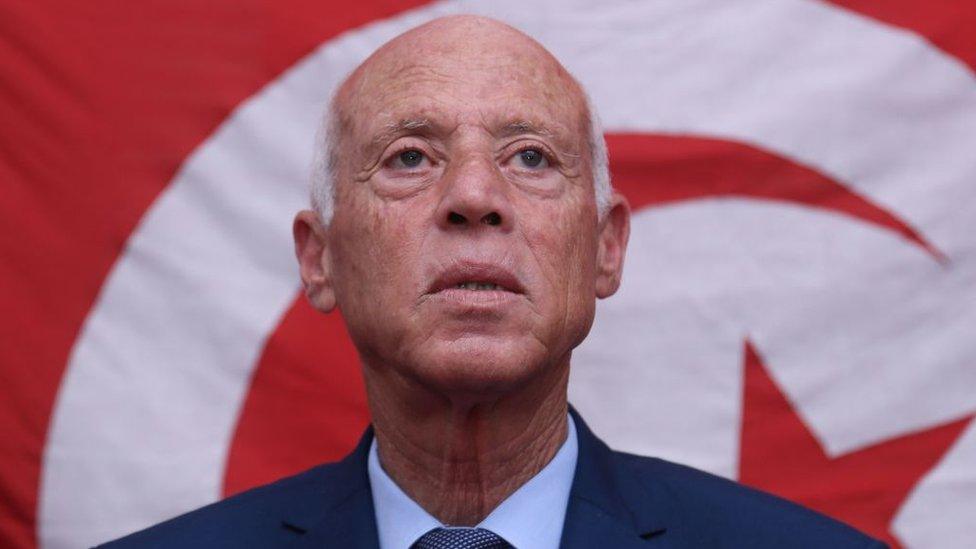
Mr Saïedhas distanced himself from all political parties and says he's not interested in creating one himself
In the week before the polls, he announced that he would personally not campaign to remove "any ambiguity" over his opponent's inability to campaign. As a law professor, he would know that Mr Karoui's incarceration had limited his opponent's ability to sell himself to voters, a point that might be brought up in court if the Qalb Tounes candidate loses the election.
It is a point also not lost on Tunisians who feel that it was a smart move that was actually a campaign strategy on its own.
He has promised electoral reforms, proposing changes to local elections that elect regional representatives.
In an interview with a local newspaper, he accused foreign powers of encouraging homosexuality in the country. He is in favour of returning the death sentence suspended since 1994 in Tunisia, and has said if he wins, his wife will not be the country's first lady.
Nadia, a budding entrepreneur, is planning to vote for Mr Saïed because "I would rather have a fight with someone who respects the constitution and the law, than someone who doesn't".
She is stunned some of her friends plan to vote for his rival. "They say 'we know that Nabil Karoui is corrupt… but we are used to corruption, we don't want a conservative,' and they don't know that actually what creates extremism in Tunisia is the corruption."
'New furniture'
Hafez, a costume designer who is part of the LGBT community likens the 2019 elections to getting rid of old furniture: "When you put the new furniture you have the new energy in the house."
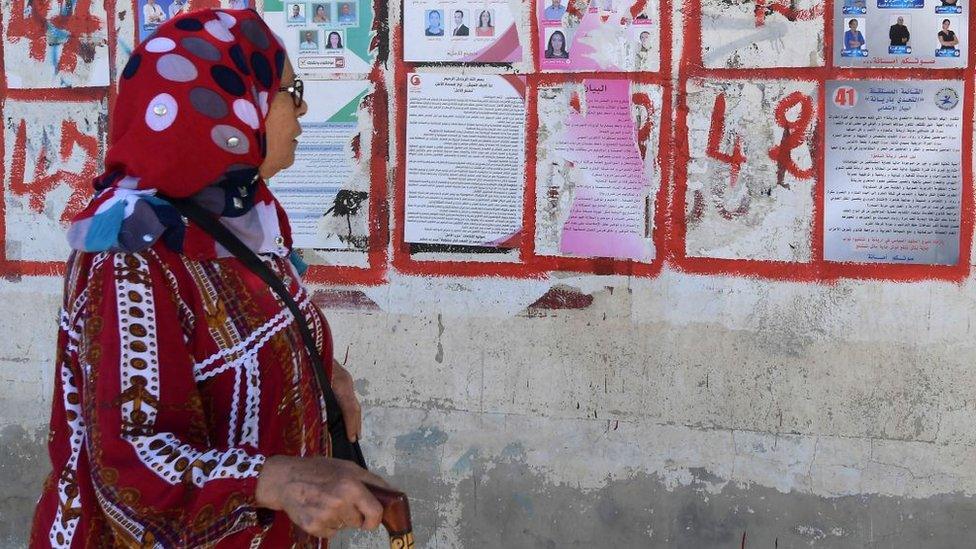
Unlike the first round when voters were faced with 26 options, Sunday's election is down to two men
He is supporting Mr Saïed, because "there is always the law with the guy, he wants to apply the law, which is what Tunisia is lacking now".
Like others, Hafez is concerned for the economy and key issues like social development and better healthcare - but he feels none of that can ever improve under a system and leadership that is lax on corruption.
The conundrum
Tunisia has a come a long way after ending years of autocratic rule in 2011, but even for the birthplace of the Arab spring, Sunday's election is an unusual position to be in.
Mr Karoui's incarceration for most of the campaign means there could be legal hurdles ahead depending on the winner.
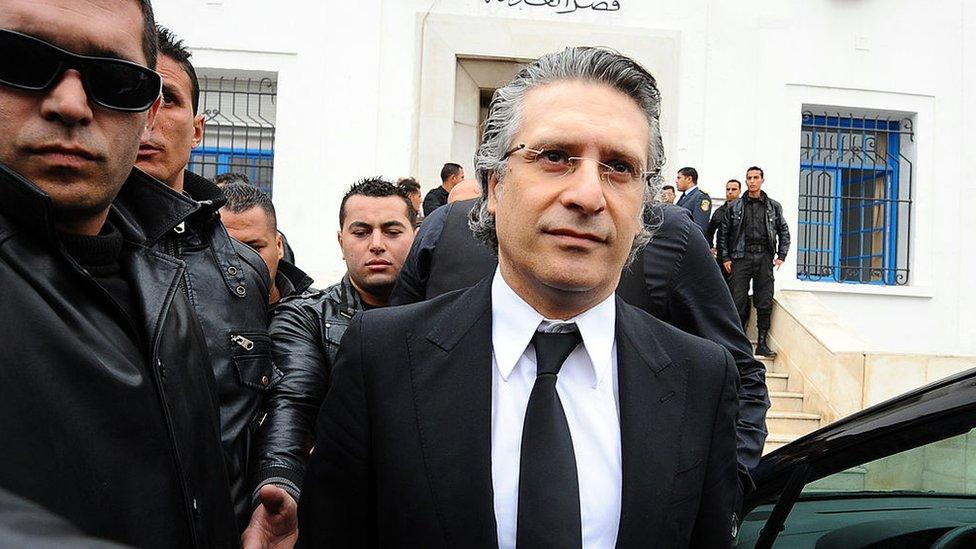
In 2012, Mr Karoui was charged with "insulting sacred values" after his TV station broadcast the film "Persepolis"
If he loses, Mr Karoui could challenge the result on the grounds that being in jail put him at an unfair disadvantage during the campaign. The decision to free him could help avoid that potentially destabilising possibility.
If he wins, he would enjoy immunity from prosecution and the trial would have to be suspended until he leaves office. The allegations would be a shadow hanging over him but that would not be new for Mr Karoui. In 2012, he was convicted of "disturbing public order" and "threatening public morals" after his TV station broadcast the movie "Persepolis", an animation that contained an image of God.
'Light years ahead'
Observers believe that Tunisia is still in transitional phase, eight years after the Arab spring.
Djordje Todorovic and Jefferey England are the spokesmen for the joint election mission to Tunisia of the International Republican Institute and the National Democratic Institute respectively.
Both men believe the country has a come a long way since the 2011 revolution that ended autocratic rule, but is still in the rebuilding process.
"In a regional context Tunisia is light years ahead, but in the middle of it, it is difficult [for people] to see that," Mr England told the BBC.
From his institute's own research and polling, Mr Todorovic is concerned that Tunisia "probably won't have a strong or stable government after this election" which is problematic for a country that needs urgent economic and fiscal reforms.
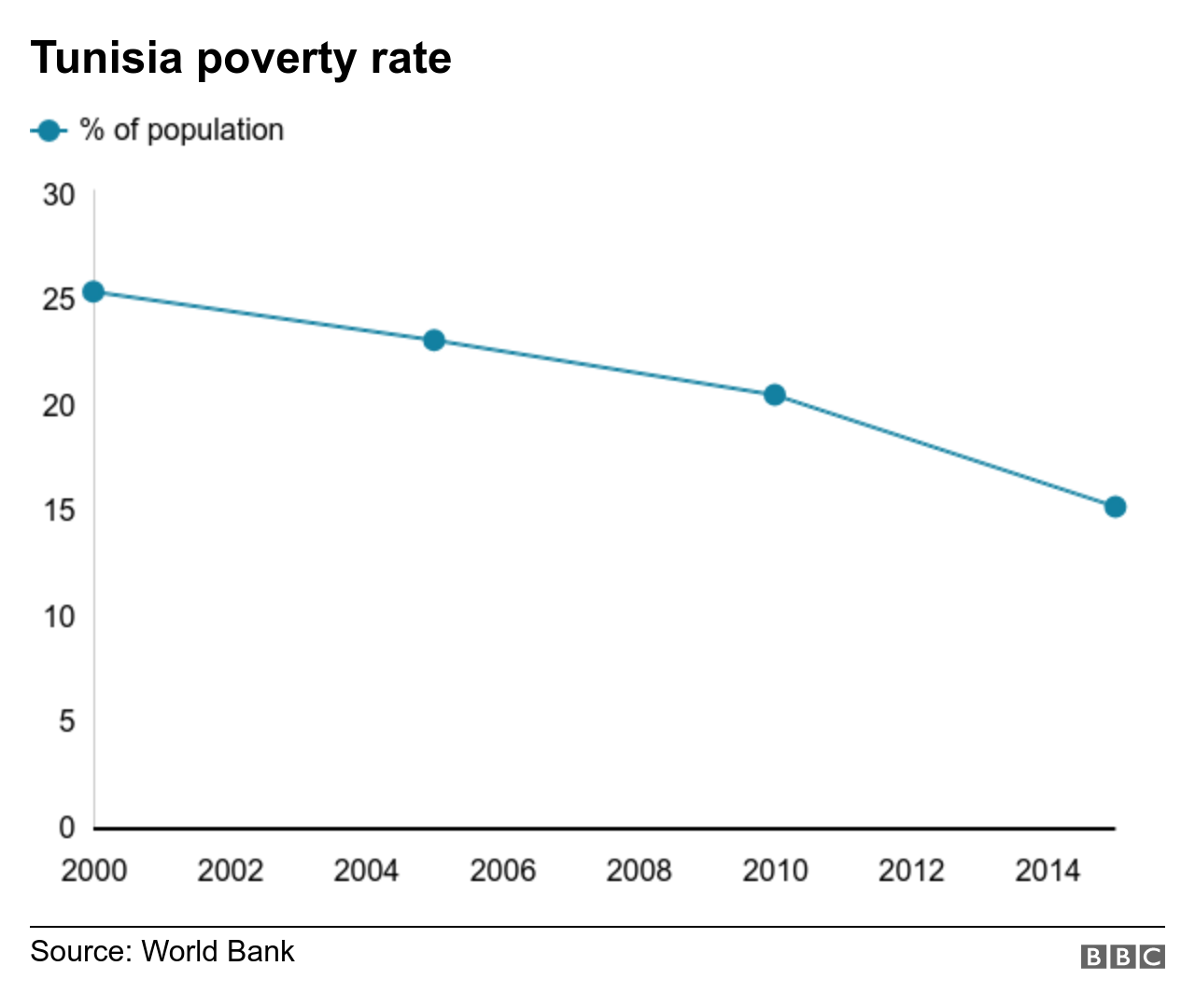
The looming prospect of a weak government, according to the head of opinion poll firm Elka Ikbal Elloumi, makes the role of the future president more important "to stabilise the country… to push political people to make an arrangement".
Mr Elloumi said he was intrigued by the presidential results from the first round. "The message is clear, they [the people] are looking for new politicians.
"Kais Saed is a social phenomenon, he represents a need from citizens for equity and justice. Nabil Karoui represents the hope of poor people, vulnerable people, not only financially poor, but people who are looking for financial opportunity."
He is surprised Mr Karoui made it to the run-off from prison "as he lost half of his voters when he was in jail".
Challenges ahead
The winning candidate will be appointed to office for a five-year term and will have control over defence, foreign policy and national security.
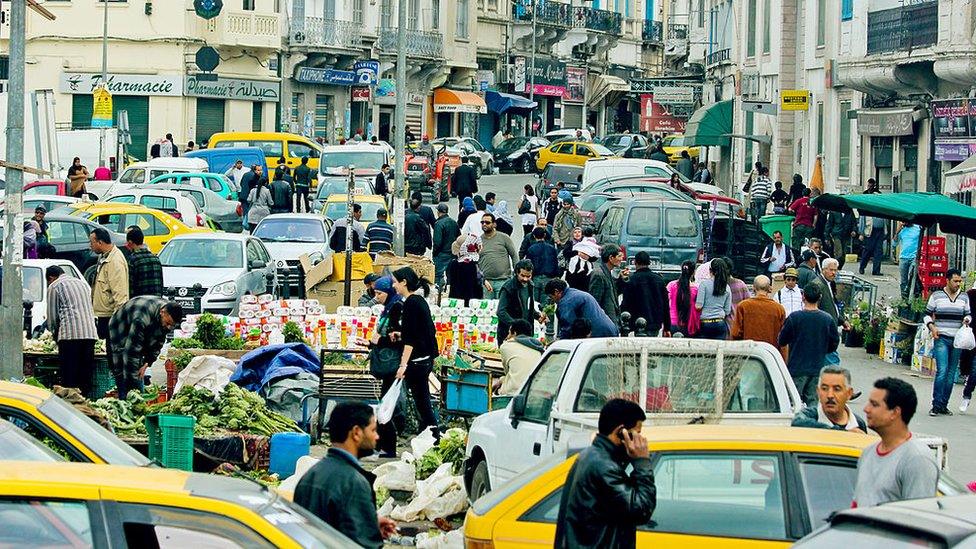
The main challenge awaiting the winner is an unemployment rate of about 15.4% of the working-age population, including 31% according to the African Development Bank Group, external.
Then there is the economy. The World Bank described Tunisia as a "country of contrasts", external, saying that the economy has not kept pace with the political transition. It however noted that official numbers show that the 2015 poverty rate in the country, at 15.2%, was significantly lower than the rate of 20.5% in 2010 before the revolution.
Tunisians feel they have matured as voters and that what might seem like "a mess" also appears to be a deepening democratic transformation for a country that is still in transition.
From the primary round of the presidential vote, to last week's legislative elections, the reality shining through some of Tunisia's darkest economic days is that the people are punishing the politicians. Big party blocs lost many of their seats in parliament to independent candidates, and the diverse and divided make-up of the new chamber could paralyse it.
As one undecided voter put it: "I think we've reached a point where no individual, nor party has absolute power. This is essential."